
A Scout hall (also Scout hut, Scout den or Scout headquarters) is a building owned or rented and used as a meeting place by a Scout Group.

A Scout hall (also Scout hut, Scout den or Scout headquarters) is a building owned or rented and used as a meeting place by a Scout Group.

A Scout hall typically consists of one or more large rooms which are used for games and Scouting activities, and may also include smaller rooms for committee meetings, storage of camping equipment and a kitchen. [1] When not being used for Scouting, Scout halls are often hired to other community groups, in a similar way to a village hall or community centre.
If the Scout hall consists of several large rooms, the various sections can have their own large room. Rooms for younger sections, such as Beaver Scouts, Rainbow Guides, Cub Scouts and Brownie Guides, are decorated with pictures and objects from their theme. Rooms for older sections are decorated with maps, knots, (small) examples of Scoutcraft and camp souvenirs. In a room for the Scout troop each patrol should have its own section. [2]
A Scout hall can be built for this use or a reuse of a building or part of a building that is not well suited for a different purpose. Sea Scout Groups may have an old cargo ship as a movable Scout hall. If there is space available, there is often a small or larger campsite next to a Scout hall. Scout halls are also used, by other Scout Groups, in particular for the younger sections, for camps or sleepovers.

The Arkadelphia Boy Scout Hut, in Central Park in Arkadelphia, Arkansas, in the United States, is on the National Register of Historic Places. The hut was constructed from 1938 to 1939 as a National Youth Administration project during the Great Depression.
The Barn Scout Hall is a heritage-listed former whaling boat servicing facility and now Scout hall and community facility in Mosman, New South Wales, Australia. It was built by Archibald Mosman. The property was added to the New South Wales State Heritage Register on 2 April 1999. [3]
Hawke Scout Hall is on the edge of Coxs Bay in Auckland, New Zealand. It originated in 1928 as a boat shed which became the headquarters of Hawke Sea Scouts; a hall was built over the top of the old boat shed in 1943. The whole building was destroyed by fire in 1952; lost amongst the contents was the White Ensign flown by the cruiser HMNZS Achilles during the Battle of the River Plate. It was rebuilt in the following year with help from the local community and the US Marines.

The wooden building now used as a Scout hall by the 1st Portsoy Scout Group in Aberdeenshire, Scotland, was originally the town's railway station. Built in 1884, the station closed in 1968 and became a Category C listed building in 1995. [4]
Terrace Park Girl Scout Cabin is a Girl Scouts clubhouse at Big Stone Gap, Wise County, Virginia. It was built in 1938 by the National Youth Administration and listed on the National Register of Historic Places in 2007. [5]
In 1953, the postmodern architect Ralph Erskine built the Ulftorp Scout hall for the KFUM Brommas Scoutkår in Bromma, Sweden. The building, on the island of Lovön in Lake Mälaren, was designed around a central fireplace heating a large common room and two small rooms on the lower floor as well as a sleeping room on the upper floor. The roof was formed like a campfire, mirroring Erskine's idea that everybody should gather around the fire. The Scout hall burned down in the late 1960s. [6] [7]
Because of their availability as a relatively low-cost space, Scout halls have sometimes been used by emerging rock or pop bands as a rehearsal or performance venue. Notable examples are: Cream, who initially rehearsed in a Scout hut in north London in July 1966; [8] the Stranglers, who rehearsed in a Scout hut at Shalford, Surrey, in 1974; [9] and the Undertones, whose first public performance in 1976 was at a Scout hut in Derry. [10] In a 2006 interview, George Michael stated that his first public performance had been with a band in a Scout hut at Bushey in Hertfordshire. [11]
| Wikimedia Commons has media related to Scout halls . |

Scouting in Arkansas has a long history, from 1913 to the present day, serving thousands of youth in programs that suit the environment in which they live.
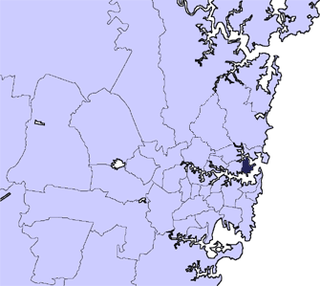
The Mosman Council is a local government area on the Lower North Shore of Sydney, New South Wales, Australia.

Berry railway station is a heritage-listed single-platform intercity train station located in Berry, New South Wales, Australia, on the South Coast railway line. The station serves NSW TrainLink diesel multiple unit trains travelling south to Bomaderry and north to Kiama. Early morning and late night services to the station are provided by train replacement bus services. In the past, the station precinct also catered to freight trains carrying cattle and dairy products.

Wollongong railway station is a heritage-listed railway station on the South Coast railway line in New South Wales, Australia. It serves the central business district of Wollongong. It was added to the New South Wales State Heritage Register on 2 April 1999.

Government House, located in Adelaide on the corner of North Terrace and King William Road, is the official residence of the governor of South Australia.

Muswellbrook railway station is a heritage-listed railway station located on the Main Northern line in Muswellbrook, in the Muswellbrook Shire local government area of New South Wales, Australia. The station serves the town of Muswellbrook and was designed by John Whitton, the Chief Engineer of NSW Railways. It is also known as Muswellbrook Railway Station and yard group and Musclebrook Railway Station. The property was added to the New South Wales State Heritage Register on 2 April 1999.

Youlbury Scout Activity Centre is one of a number of The Scout Association's National Scout Activity Centres in the United Kingdom and is the oldest permanent Scout campsite in the world.
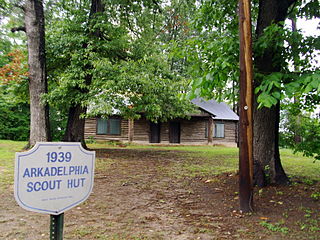
The Arkadelphia Boy Scout Hut, located in Central Park in Arkadelphia, Arkansas is on the National Register of Historic Places. Since the roof and the original shutters and windows were replaced in 1953, in the Hut is precluded from being listed on the National Register under Criterion C. However, it listed under Criterion A as a "property that made a contribution to the major pattern of American history".
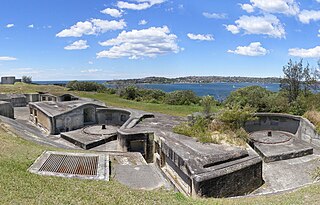
The Middle Head Fortifications is a heritage-listed former defence establishment and military fortifications and now public space located at Middle Head Road, Middle Head, Mosman in the Mosman Council local government area of New South Wales, Australia. It is also known as the Middle Head Military Fortifications or The Old Fort. The fortifications consist of the Outer Middle Head Battery located at the end of Old Fort Road, the Inner Middle Head Battery located at the end of Governors Road, and the Obelisk batteries reached by a path from the corner of Middle Head Road and Chowder Bay Road. The fortifications at Middle Head formed part of Sydney Harbour's defences. The property is owned by the NSW Office of Environment and Heritage. It was added to the New South Wales State Heritage Register on 2 April 1999.
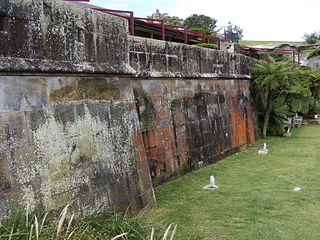
The Georges Head Battery, also called the Georges Head Military Fortifications, is a heritage-listed former military fortification located on the Georges Head on Chowder Bay Road, Georges Heights, in the suburb of Mosman, in the Mosman Council local government area of New South Wales, Australia.
The Scout Association of New Zealand's Sea Scouts are Scout Groups specialising in water-based activities. In 2017, there were around 900 Sea Scouts in New Zealand in 53 troops around the country.

Bellevue Homestead is a heritage-listed homestead currently located in Coominya, Somerset Region, Queensland, Australia. It was built from c. 1872 to c. 1910. It was added to the Queensland Heritage Register on 21 October 1992.

Mosman is an affluent suburb on the Lower North Shore region of Sydney, in the state of New South Wales, Australia. Mosman is located 8 kilometres north-east of the Sydney central business district and is the administrative centre for the local government area of the Municipality of Mosman.
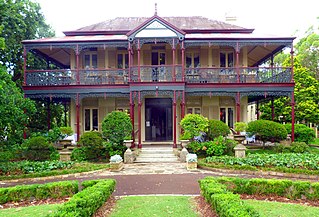
Boronia House is a heritage-listed former residence located at 624-632 Military Road, Mosman in the Mosman Council local government area of New South Wales, Australia. It was designed by Sheerin & Hennessy (1885) and Clive Lucas & Partners, and built during 1885. The property is owned by Mosman Council. The property is also called Boronia. It was added to the New South Wales State Heritage Register on 2 April 1999.
Archibald Mosman was a Scottish-born merchant, grazier and whaler in New South Wales, Australia.

Jarlsminde is a farm and a listed building in Aarhus, Denmark. The farm was built in 1798 and was listed in the Danish national registry of protected buildings and places by the Danish Heritage Agency on 3 June 1997. The farm is situated in the suburb Stavtrup about 7-8 km. south-west of the city centre of Aarhus where it sits on a hill with a view of Brabrand Lake and the large urban areas on the other side of it.

Bank of New South Wales is a heritage-listed former bank building at 34-36 Gill Street, Charters Towers City, Charters Towers, Charters Towers Region, Queensland, Australia. It was designed by Eyre & Munro and built in 1889 by Kelleher. It is also known as Wherry House. It was added to the Queensland Heritage Register on 9 November 2012.

The Barn Scout Hall is a heritage-listed former whaling boat servicing facility and now Scout hall and community facility at 3a Avenue Road, Mosman in the Mosman Council local government area of New South Wales, Australia. It was built by Archibald Mosman. It is also known as Whaling Station. The property is owned by The Scout Association of Australia NSW Branch 1st Mosman 1908 Scout Troop. It was added to the New South Wales State Heritage Register on 2 April 1999.

28 Mistral Avenue is a heritage-listed residence located at 28 Mistral Avenue, Mosman in the Mosman Council local government area of New South Wales, Australia. It was designed by E. Jeaffreson Jackson. It is also known as 8 Magic Grove. It was added to the New South Wales State Heritage Register on 2 April 1999.

Queensland National Bank is a heritage-listed former bank building at 72 Mosman Street, Charters Towers City, Charters Towers, Charters Towers Region, Queensland, Australia. It was designed by Francis Drummond Greville Stanley and built from 1891 to 1949. It is also known as the Charters Towers' City Hall. It was added to the Queensland Heritage Register on 26 June 2020.